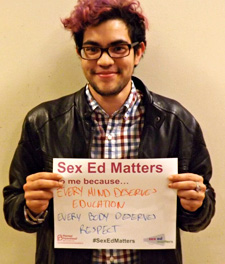By: Luke Sherman/TRT Reporter—
Seeking to improve the sexual, emotional, and mental health of young Bay Staters, Planned Parenthood Advocacy Fund of Massachusetts (PPAF) held a rally in Boston last month featuring impassioned speeches from high school and college students, parents, teachers, and elected officials. Speakers at the event exhorted attendees to join the campaign to pass An Act Relative to Healthy Youth, proposed legislation that the Massachusetts Senate approved late last year but which the House of Representatives has yet to vote on.
“This is a not radical ask,” said State Senator Sonia Chang-Diaz (D-Boston), a speaker at the rally.
If enacted, the bill would require all public and charter schools in Massachusetts that teach sexual education to select an appropriate curriculum that is medically accurate, age-appropriate, and comprehensive. Currently, the state does not mandate school districts to teach sexual education in a specific fashion, leading some to focus exclusively on abstinence.
Citing research that demonstrates that educating students about both abstinence and proper contraceptive use lowers the teenage pregnancy rate and the incidence of sexually transmitted infections (STIs) among adolescents, backers of the campaign argue that the Bay State should pass An Act Relative to Healthy Youth to improve students’ overall health.
“This bill is about providing our youth access to information at a time when they need it the most so that they can make the most healthy and informed decisions,” said State Representative James O’Day (D-West Boylston), one of the bill’s lead sponsors. “Providing comprehensive, age-appropriate, and medically accurate information about their bodies and their options is our duty as a commonwealth.”
Lawmakers introduced similar legislation for the first time in 2011 and then again in 2013. Both times the bill failed to move out of committee. This session, proponents hope that they have enough momentum to push it over the finish line, pointing to the Senate’s passage of the bill by a vote of 32-6.
Enactment of this legislation would bring Massachusetts in line with a number of other states across the country. According to research from the Guttmacher Institute, a non-profit organization seeking to advance reproductive health, 13 states require that sexual education, when instructed, include medically accurate information. Twenty-six states and Washington, D.C., mandate that educators employ a curriculum appropriate to the age of the students. Eighteen states and the nation’s capital require that students, if they receive sexual education, learn proper contraceptive use.
Supporters of the initiative maintain that a broad majority of parents support instruction of sexual education in schools. According to a 2004 national survey jointly conducted by National Public Radio, the Kaiser Family Foundation, and the Harvard University Kennedy School of Government, 93 percent of parents of middle school students and 91 percent of parents of high schoolers believe that it is either very or somewhat important that educators teach their students sexual education.
But opponents of the legislation contend that Beacon Hill should not impose curricula on individual schools.
“SB 2062, An Act Relative to Healthy Youth, would effectively impose a one-size-fits-all approach to sexual health education on public schools in Massachusetts,” said Andrew Beckwith, president of the Massachusetts Family Institute. “We believe local school districts should retain the right to determine which curricula are appropriate for their students through the input of parents and educators in their own community.”
A number of Massachusetts-based advocacy organizations have endorsed the proposed legislation, including Jane Doe Inc., the Massachusetts Alliance on Teen Pregnancy, and MassNOW. LGBTQ advocates have joined the fight, as well.
“It’s vitally important in this day and age that all youth have access to medically accurate, comprehensive sex and health education,” said Executive Director of MassEquality Deborah Shields. “It’s especially important that we educate all students that LGBTQ youth deserve a safe and equal space at school and in the curriculum.”
Indeed, the LGBTQ youth population in Massachusetts faces serious sexual and mental health disparities relative to other students. According to the 2013 Massachusetts Youth Risk Behavior Survey conducted by the Massachusetts Department of Early and Secondary Education (DESE), compared to their peers, LGB students were more than five times more likely to have attempted suicide in the past year, reported higher rates of contracting an STI, and had a statistically significant greater likelihood of skipping school as a result of feeling unsafe. (DESE did not collect data on transgender students.)
PPAF and its allies argue that this bill would improve the school climate for LGBTQ students by causing more educators to teach sexual education curricula that help youth understand sexual orientation and gender identity incorporate positive representations of LGBTQ people, and dispel common myths and stereotypes about behavior and identity.
“We need to ensure that all students get medically accurate information about LGBTQ health choices and that entire schools learn that it’s traumatizing and wrong to bully, harass, discriminate, and insult students who are LGBTQ. We’ve seen far too many suicides among young people,” Shields said. “This bill goes a long way in reducing harm and promoting health for all students. We are required by the Constitution to maintain a separation of church and state. It’s about time to enact that in our health and sex education.”
Moving forward, PPAF and its allies plan to continue to lobby legislative leaders and Governor Charlie Baker, a Republican, to pass this bill. For more information on the campaign, visit pplmvotes.org.







